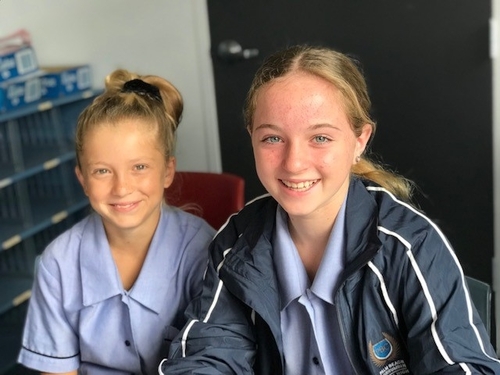Middle School Update
Social Media
Social media is an increasing part of our everyday lives with many teenagers having access to a digital platform, system, website or app that enables them to create and share content, and connect with each other. One of the many popular social media sites ReachOut.com provides parent support including information about the most popular sites your child may be accessing. There are risks and benefits for your child using social media.
Facts
- On average, children aged 10 to 14 years have 2 active social media accounts
- On average, outside of school, 10 to 14 year olds spend 23 hours online per week
- 12% of 10 to 14 year olds share personal information online
- In 2018, Facebook had 583 million fake accounts and Instagram had 95 million
Do you know your child’s digital identify?
- get your child to Google their name
- if there is any negative content, delete or report to the website where it is posted
- if there is an old media account, take steps to remove it. If they have lost access to any account, contact the social media provider and request it be deleted.
- if you child is tagged in an embarrassing photo or video ask the person to delete it. If they won’t, report the post and un-tag it yourself.
- has your child added a ‘random’? If you don’t know them in the real world, delete or block them.
Protect your child
- block your child from accessing specific websites, apps or functions
- filter different kinds of content — such as ‘adult’ or sexual content, content that may promote self-harm, eating disorders, violence, drugs, gambling, racism and terrorism
- monitor your child’s use of connected devices, with reports on the sites they visit and the apps they use, how often and for how long?
- set time limits, blocking access after a set time
Used in conjunction with Parental guidance and discussing cyber-safety with your children, there are many eSafety Applications available that can be used to protect them when they are on-line. Most can provide a filtering and monitoring service for home internet use as well as mobile devices. Many will help you as parents to:
- manage screen time
- set routines for sleep, study and screen time
- keep content child friendly
- remove adult content from searches
- restrict social media use
- manage social media apps and in-app purchases
- locate devices
- tracks devices
- protect devices at home and on the go
We would encourage parents to visit the government official E Safety website www.esafety.gov.au for further support. In addition we recommend that you contact your internet service provider (ISP) Telstra, Optus, Dodo, TPG etc. and seek support on Internet parental controls through them, most ISPs offer router based parental controls with their subscription.
eSafety Applications
- Family Zone
- Qustodio Parental Controls
- Net Nanny
- Norton family Premier
- Surfie (Mobile)
Signs that your child’s online activity may be having a negative impact on them or on your family include:
- less interest in social activities like meeting friends or playing sport
- not doing so well at school
- tiredness, sleep disturbance, headaches, eye strain
- changes in eating patterns
- reduced personal hygiene
- obsession with particular websites or games
- extreme anger when being asked to take a break from online activity
- appearing anxious or irritable when away from the computer
- becoming withdrawn from friends and family
If necessary, you can get help for your child through a counselling or online support service.
Cybersafety and Cyberbullying provides important information for parents about cybersafety and cyberbullying. It suggests what parents and caregivers could do if their child is the target of, or is responsible for, inappropriate online behaviour.
A new report cyberbullying icon is now featured on all state school computers.
The digital world is fundamental to education and entertainment in this technological age. However, it needs to be a safe and secure place for our young people.
Reporting cyberbullying and getting inappropriate content removed is one step towards a safer online world. The new report cyberbullying icon is an initiative of the Department of Education.
If you or your child are concerned about cyberbullying, report it.
Bookmark that webpage on your child’s bring-your-own (BYOD) device so they can:
- make a complaint
- find someone to talk to
- get advice on dealing with cyber issues
There's help for removing cyberbullying material from websites and social media, and for reporting offensive or illegal content.
There's also a direct link to Kids Helpline, offering free and confidential online and telephone counselling 24 hours a day, seven days a week.
School Attendance Everyday Counts
Every parent of a child who is of compulsory school age has the legal obligation to ensure their child is enrolled and attends a school, on every school day for the educational program in which the child is enrolled, unless the parent has a reasonable excuse. School absenteeism and truancy can impact significantly on students' learning and wellbeing. Research shows that in Queensland, higher student attendance is associated, on average, with higher student achievement. Additionally, attending school every day helps children to build social and emotional skills such as communication, teamwork and resilience.
Parents and caregivers must send children to school every school day under Queensland law unless there is an acceptable reason such as:
- illness
- doing work experience
- competing in school sporting events.
Avoid keeping your child away from school for reasons such as:
- birthdays
- shopping
- visiting family and friends
- if they sleep in
- looking after other children
- minor check ups or care, such as hair cuts.
Routine medical or other health appointments should be made either before or after school or during the school holidays.
Establishing good routines around school can assist with regular school attendance. These include:
- have a set time to go to bed
- have a set time to get out of bed
- have uniform and school bag ready the night before
- have a set time for starting and finishing breakfast
- set a time for daily homework activities
- speak about school positively
- send your child to school every school day including their birthday and the last day of term.
Schools must monitor attendance of students and follow up with parents and caregivers any unexplained absences. If your child does not want to go to school, or is missing school without you knowing, contact your school immediately for assistance and support. If you are having trouble getting your child to school, please call and talk with either our Guidance Officer or Year Level Dean.
NAPLAN 2019
Thank you NAPLAN parents!
Thank you to every parent who supported their student through the NAPLAN testing last week, and who actively stayed in touch with the school about absences. We had a large number of students attend the catch up tests on Friday, which means that families will now get a fuller snapshot of the students’ progress in their essential literacy and numeracy.
Our Year 7 and Year 9 students are to be congratulated for their amazing efforts over the three days of NAPLAN. They were calm, settled, prepared and almost every student visibly gave their best effort. They should be proud of their work.
The QCAA will release NAPLAN reports later this year, at which time they will be mailed home to families. Each year, PBC uses the data as part of its ongoing efforts to improve teaching and learning for every student. We look forward to sharing our school results in Semester 2.
This year will have been the final ‘paper’ NAPLAN for our Year 7 students. We are moving to online testing in 2020, along with every other Queensland school. Teachers will be focussed on preparing students for the changed testing environment in the months ahead, with Year 8 and Year 7 students participating in a NAPLAN ‘trial’. These trials will take only one lesson and are not assessed in any way. However, they will familiarise students with the new test environment and allow PBC to assess its readiness for the technological challenges of online assessment.
Connect For Success
Earlier this term, parents and caregivers across the Middle School should have received by email Connect for Success, a list of all Term 2 student assessment and the due dates. While ultimately it is the students’ responsibility to organise your time, it can help the planning of family schedules if parents know when their child can expect to be busy with assessment, need an early night and so forth. Please contact your child’s teacher for further information on any particular item.
Please note that core assessment this term spans across Weeks 7 to 10. When the assessment occurs well before the holidays, teachers will be commencing the next unit of work, and students will be involved in significant work up to the last day of term. For this reason, we request that parents arrange for students’ holidays to be taken during the official holiday period only. For further information, see the Assessment Policy.
QuickSmart Update
QuickSmart students enjoyed a special breakfast before Tuesday’s tests, to celebrate positive participation. Attendance this semester has been very high, with many QuickSmart students having been to 100% of the sessions offered (except when assessment is occurring).
Our specialist QuickSmart Teacher Aides report that the students are responsive and making significant improvements in their reading and numeracy skills. Notably, the self- confidence of students has improved enormously since the beginning of the program.
We welcome QuickSmart parents though to visit during Week 6, and see their children in action. Could you beat your child in the flash card challenge?






